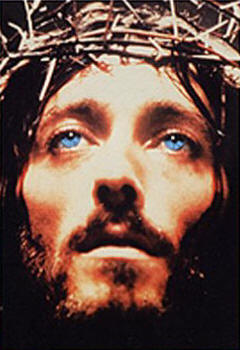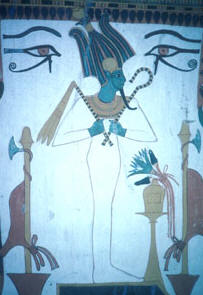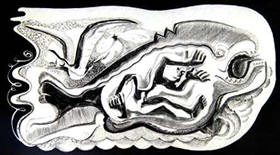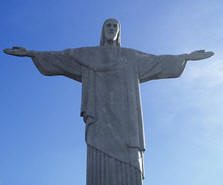Rethinking Resurrection
 I am poured out like water, and all my bones are out of joint. My heart has turned to wax; it has melted away within me. My strength is dried up like a potsherd, and my tongue sticks to the roof of my mouth; you lay me in the dust of death. Dogs have surrounded me; a band of evil men has encircled me, they have pierced my hands and my feet. Psalm 22:14-16
I am poured out like water, and all my bones are out of joint. My heart has turned to wax; it has melted away within me. My strength is dried up like a potsherd, and my tongue sticks to the roof of my mouth; you lay me in the dust of death. Dogs have surrounded me; a band of evil men has encircled me, they have pierced my hands and my feet. Psalm 22:14-16It is Good Friday. Christians around the world are commemorating the crucifixion and death of Jesus Christ. At first glance, it appears odd that such an observation would be known as Good Friday, but if we look deeper, look beyond, we will see that it is indeed...good.
 Throughout the millennia, human beings have developed a mythos around the seemingly impossible hope of resurrection. It is a brave hope, a desire to overcome the ever nearing reality of the grave. The Sumerians who created the world's first civilization told the story of Dumuzi, a fertility god who was carried off to the underworld during the hot Summer months, only to rise again at the autumnal equinox. The mythology of the Egyptians describe the brutal murder of Osiris, his descent to the underworld, and his eventual resurrection and establishment of the god of afterlife. The Greeks held that Dionysus experienced a resurrection of sorts, as did the Persian Mithras. Polynesian legends speak of a divine eel that gave up its life, only to rise again as a coconut tree so that the islanders would be provided with sustenance.
Throughout the millennia, human beings have developed a mythos around the seemingly impossible hope of resurrection. It is a brave hope, a desire to overcome the ever nearing reality of the grave. The Sumerians who created the world's first civilization told the story of Dumuzi, a fertility god who was carried off to the underworld during the hot Summer months, only to rise again at the autumnal equinox. The mythology of the Egyptians describe the brutal murder of Osiris, his descent to the underworld, and his eventual resurrection and establishment of the god of afterlife. The Greeks held that Dionysus experienced a resurrection of sorts, as did the Persian Mithras. Polynesian legends speak of a divine eel that gave up its life, only to rise again as a coconut tree so that the islanders would be provided with sustenance. Even our modern tales carry this primal desire aloft. I love how the movie Braveheart shows the impassioned rise of the warriors of Scotland following the horrific execution of William Wallace. Neo experiences death at the hands of computer-controlled agents of the Matrix, but then is restored with an even greater power and sense of purpose. Gandalf the Grey falls to his doom, doing battle with the demonic Balrog in the darkness of Moria, but is then reborn into Middle Earth as Gandalf the White, head of the Order. Resurrection is and always has been the great hope of humanity.
Nature itself conveys the deep longing. Spring turns to Summer, which turns to Autumn, then eventually to Winter. With a beautiful intensity, the endless Winter once again gives way to the joy of Spring. A seed dies, is buried, and rises again as a flowering plant, something much more majestic that it once was. The sun dies in the west and rises again in the east. Sorrow and death are overcome by laughter and splendor. All creation speaks of this mystery.
In the first century AD, Jesus of Nazareth, a real historical figure, embodied what all the myths had echoed throughout the centuries. He incarnated the hopeful mystery of restoration whispered by the first sweet winds of Spring and the bright rays of the dawn. Just as an author makes use of foreshadowing in a good novel, so too does the Author make use of this literary tool in the Great Story. Jesus was crucified on a hill called "The Skull" and buried in a rock tomb. This all happened on a Friday.
But You caused my life to ascend up from the pit, Yahweh, my God. - Jonah 2:6
 The entombment of Christ is often compared metaphorically with an earlier biblical story, that of Jonah. In the book of Jonah, the prophet is swallowed by a whale due to his refusal to obey God. What is the significance of Jonah in the belly of the whale? Well, the belly is where digestion takes place. One substance is destroyed, broken down, and through this transformation, the substance is converted to energy. The tomb in ancient times was viewed in much the same way. The term "sarcophagus" literally means "flesh eater" because what was temporal wasted away in the tomb.
The entombment of Christ is often compared metaphorically with an earlier biblical story, that of Jonah. In the book of Jonah, the prophet is swallowed by a whale due to his refusal to obey God. What is the significance of Jonah in the belly of the whale? Well, the belly is where digestion takes place. One substance is destroyed, broken down, and through this transformation, the substance is converted to energy. The tomb in ancient times was viewed in much the same way. The term "sarcophagus" literally means "flesh eater" because what was temporal wasted away in the tomb. When the disciples of Jesus went to his tomb early Sunday morning, they found it empty. He had risen. Death had been overcome. Likewise, Jonah was vomited out on the shore, a changed man. The belly of the whale had digested the old self and had created a new man. The resurrection of Jesus pierced the veil that separated the temporal and the eternal, creating a way for humanity to partake in the same transformation that poets, prophets, storytellers, and nature itself expressed in epics, oracles, and the germinating seed.
When the disciples of Jesus went to his tomb early Sunday morning, they found it empty. He had risen. Death had been overcome. Likewise, Jonah was vomited out on the shore, a changed man. The belly of the whale had digested the old self and had created a new man. The resurrection of Jesus pierced the veil that separated the temporal and the eternal, creating a way for humanity to partake in the same transformation that poets, prophets, storytellers, and nature itself expressed in epics, oracles, and the germinating seed. Are you experiencing the belly of the whale right now? Are you sealed in some personal tomb? What is being digested and broken down in your life? Allow the transformative power of Christ's resurrection to create a new life within your heart, an Easter of your own. There is hope...never lose sight of this even in your darkest hours.
The sign of the cross has to be looked upon as a sign of eternal affirmation of all that ever was or shall ever be. It symbolizes not only the one historic moment on Calvary but the mystery through all time and space of God's presence and participation in the agony of all living things. - Joseph Campbell
Labels: Christ, cross, crucifixion, death, Easter, Good Friday, Jesus, Jonah, metaphor, resurrection, tomb



0 Comments:
Post a Comment
<< Home